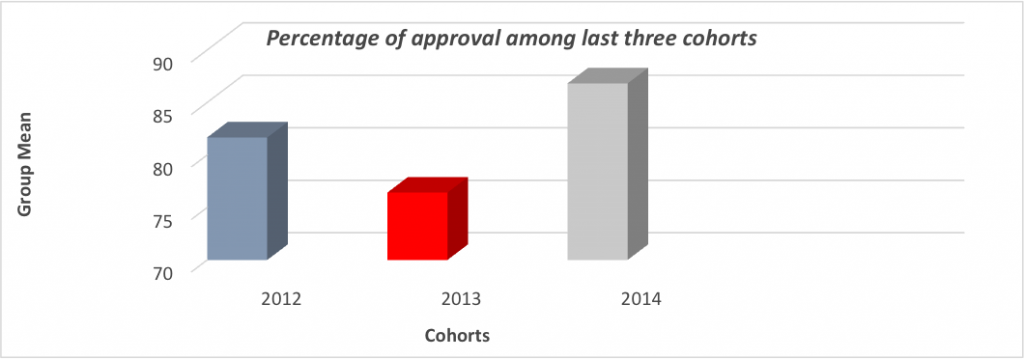My name is Ana R. Pinilla. I am a clinical psychologist and Associate Professor of Graduate Clinical Psychology at The Pontifical Catholic University of Puerto Rico. After finishing a year at the AEA Minority Serving Institute (MSI) Fellowship in October 2014, I am happy to share the lessons learned in teaching evaluation, through my experience at the fellowship.
I have been teaching a Program Evaluation course for 15 years to students who do not have a broad knowledge about investigative and evaluative methodology. These students have great difficulty visualizing the pertinence of being evaluators in addition of clinicians. As a consequence, the performance of those students in Program Evaluation (PE) classes usually was poor. For example, only 78. 94% in 2011, and 78.75% in 2012 of students approved the PE course in my graduate clinical psychology program. In 2013, this percentage decreased to 44.44%. My individual project help me focus on particular elements in need of change, to make a difference in performance of my last session.
A new course design based on: The introduction of an adaptation of a competency based education model, modifications in content and methodology (Integration of an in class practice and a course syllabus reduction to the basics of evaluation), proved to be effective for this course cohort to improve from the 44.44 % approval rate for last year, to a 90.9% approval rate for the present year. These students also improved significantly their attitudes toward Program Evaluation (PE), ending 90.8% of students with attitudes favorable or very favorable and finally a 100% of the group, managed to articulate a theory of action and change and demonstrated capacity for the development of an Evaluation Plan. None of this achievements had been possible in previous years. The graphic below illustrates some of these changes.
Lessons Learned:
- Students’ performance improves when a method that instills motivation and better attitudes toward PE is used.
- The introduction of a Competency-based Education approach, seems a good alternative when students lack basic research tools and are facing the challenge of learning a new skill, identified as unrelated to their work.
- Guiding them with this approach facilitates students’ acceptance of the subject matter, which contributes to better results in their academic achievement.
The American Evaluation Association is AEA Minority Serving Institution (MSI) Fellowship Experience week. The contributions all this week to aea365 come from AEA’s MSI Fellows. For more information on the MSI fellowship, see this webpage: http://www.eval.org/p/cm/ld/fid=230 Do you have questions, concerns, kudos, or content to extend this aea365 contribution? Please add them in the comments section for this post on the aea365 webpage so that we may enrich our community of practice. Would you like to submit an aea365 Tip? Please send a note of interest to aea365@eval.org. aea365 is sponsored by the American Evaluation Association and provides a Tip-a-Day by and for evaluators.

